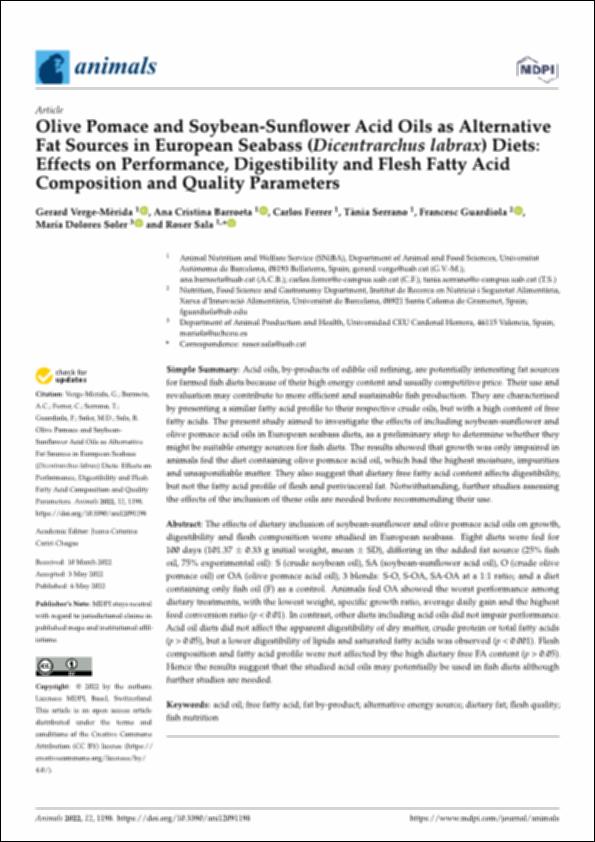Por favor, use este identificador para citar o enlazar este ítem:
http://hdl.handle.net/10637/14307Olive pomace and soybean-sunflower acid oils as alternative fat sources in European Seabass (Dicentrarchus labrax) diets effects on performance, digestibility and flesh fatty acid composition and quality parameters
| Título : | Olive pomace and soybean-sunflower acid oils as alternative fat sources in European Seabass (Dicentrarchus labrax) diets effects on performance, digestibility and flesh fatty acid composition and quality parameters |
| Autor : | Verge Mèrida, Gerard Barroeta Lajusticia, Ana Cristina Ferrer, Carlos Serrano, Tània Guardiola Ibarz, Francesc Soler Sanchis, María Dolores Sala Pallarés, Roser |
| Materias: | Lubinas - Alimentación.; Ácidos grasos.; Fatty acids.; Oils and fats, edible - Quality control.; Peces - Alimentación.; European seabass - Feeding and feeds.; Aceites y grasas comestibles - Control de calidad.; Fishes - Feeding and feeds.; Piscicultura.; Fish culture. |
| Editorial : | MDPI |
| Citación : | Verge-Mèrida, G., Barroeta, A. C., Ferrer, C., Serrano, T., Guardiola, F., Soler, M. D. & Sala, R. (2022). Olive pomace and soybean-sunflower acid oils as alternative fat sources in "European Seabass" (Dicentrarchus labrax) diets: effects on performance, digestibility and flesh fatty acid composition and quality parameters. Animals, vol. 12, i. 9 (06 may.), art. 1198. DOI: https://doi.org/10.3390/ani12091198 |
| Resumen : | The effects of dietary inclusion of soybean-sunflower and olive pomace acid oils on growth, digestibility and flesh composition were studied in European seabass. Eight diets were fed for 100 days (101.37 0.33 g initial weight, mean SD), differing in the added fat source (25% fish oil, 75% experimental oil): S (crude soybean oil), SA (soybean-sunflower acid oil), O (crude olive pomace oil) or OA (olive pomace acid oil); 3 blends: S-O, S-OA, SA-OA at a 1:1 ratio; and a diet containing only fish oil (F) as a control. Animals fed OA showed the worst performance among dietary treatments, with the lowest weight, specific growth ratio, average daily gain and the highest feed conversion ratio (p < 0.01). In contrast, other diets including acid oils did not impair performance. Acid oil diets did not affect the apparent digestibility of dry matter, crude protein or total fatty acids (p > 0.05), but a lower digestibility of lipids and saturated fatty acids was observed (p < 0.001). Flesh composition and fatty acid profile were not affected by the high dietary free FA content (p > 0.05). Hence the results suggest that the studied acid oils may potentially be used in fish diets although further studies are needed. |
| Descripción : | Este artículo se encuentra disponible en la siguiente URL: https://www.mdpi.com/2076-2615/12/9/1198 Este artículo de investigación pertenece al número especial "Advances in Animal Novel Alternative Feed". |
| URI : | http://hdl.handle.net/10637/14307 |
| Derechos: | http://creativecommons.org/licenses/by/4.0/deed.es |
| ISSN : | 2076-2615 (Electrónico) |
| Idioma: | es |
| Fecha de publicación : | 6-may-2022 |
| Centro : | Universidad Cardenal Herrera-CEU |
| Aparece en las colecciones: | Dpto. Producción y Sanidad Animal, Salud Pública Veterinaria y Ciencia y Tecnología de los Alimentos |
Los ítems de DSpace están protegidos por copyright, con todos los derechos reservados, a menos que se indique lo contrario.


